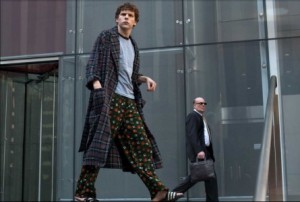Want smarter insights in your inbox? Sign up for our weekly newsletters to get only what matters to enterprise AI, data, and security leaders. Subscribe Now
 Last night, I watched The Social Network, the much-anticipated movie about the founding of Facebook from Hollywood storytellers Aaron Sorkin and David Fincher. And as the credits rolled, I found myself thinking that it could have been much, much worse for Mark Zuckerberg, Facebook’s youthful CEO, who finds his life being chronicled when much of it has yet to unfold.
Last night, I watched The Social Network, the much-anticipated movie about the founding of Facebook from Hollywood storytellers Aaron Sorkin and David Fincher. And as the credits rolled, I found myself thinking that it could have been much, much worse for Mark Zuckerberg, Facebook’s youthful CEO, who finds his life being chronicled when much of it has yet to unfold.
The Social Network draws largely on court documents filed in lawsuits by Harvard schoolmates of Zuckerberg, who claim he elbowed them out of Facebook in its formative years. The film, written by Aaron Sorkin and directed by David Fincher, paints a picture of Facebook’s founder, played by Jesse Eisenberg, as a driven, arrogant jerk with a compelling vision of bringing the social experience of life fully online — and little patience for anyone who might slow him down along the way.
Are we surprised? The Zuckerberg we have seen in public appearances is similarly driven and similarly arrogant, resistant to any polish applied by his corporate handlers or solicitous interviewers. And so are many entrepreneurs: The New York Times recently noted how many are just manic enough to believe they can change the world.
Zuckerberg’s speed bumps on the road to riches were Cameron and Tyler Winklevoss and Divya Narendra, the founders of a rival social network, ConnectU; and Eduardo Saverin, a college friend and long-unacknowledged cofounder of Facebook. (Facebook officially denied Saverin’s status as cofounder until early 2009, after Zuckerberg and Saverin apparently settled their lawsuit.)
The Winklevosses, Narendra, and Saverin get largely sympathetic portrayals in the movie. Saverin, in particular, is shown as deeply hurt by Zuckerberg’s neglect as Facebook moves to California and finds new financial backers.
But had the filmmakers followed Facebook’s story beyond its earliest days, they might have seen more of a pattern. Saverin is not the only cofounder who parted ways with Zuckerberg. Not a single one remains at the company.
And a series of top executives who were once close to Facebook’s chief have fallen away: Doug Hirsch, Owen Van Natta, Matt Cohler, Gideon Yu — the list goes on. (Cohler, now a general partner at Benchmark Capital, remains an advisor to Zuckerberg, but tellingly refuses to talk about the company in public interviews.)
And the Business Insider, an online news site, has published instant messages from Zuckerberg’s Harvard days. (The company has never disputed their authenticity, merely labeling them as “dated.” My own reporting indicates that their contents are accurate.) They show a disturbingly vindictive side of Zuckerberg, a disdain for Facebook’s users, and a deliberate pursuit of revenge.
“Every creation myth needs a devil,” a lawyer tells Zuckerberg in the movie (a line borrowed from a Facebook spokesperson after he watched an early cut of the film). Had material from the instant messages made it into the movie, The Social Network might have been a far darker film, and Facebook’s critics might well have had their devil on screen.
Facebook’s success is inarguable: it has 500 million users, half of whom log into the site on any given day, across the world. So maybe Zuckerberg was right in shoving aside once-close advisors who displeased him in some way.
But Zuckerberg will one day seek new partners who cannot be so easily shoved aside if they slow him down — namely, public investors. Early Facebook investor Peter Thiel, who gets a brief if mostly heroic portrayal in The Social Network, recently told Fox Business that he expects Facebook to go public one day, perhaps as soon as late 2012.
Here’s the question: Knowing what we know about Mark Zuckerberg, through court documents, leaked instant messages, and now this largely accurate if incomplete dramatic depiction, will shareholders entrust him with their money? And even if shareholders accept the idea of Zuckerberg as Facebook’s leader, will he withstand the heightened scrutiny he’ll endure as a public company’s CEO?
By setting Facebook’s IPO date a couple of years in the future, Thiel, a Facebook board member, is wisely postponing the reckoning of that issue. For now, Facebook remains a Mark Zuckerberg production. But he has yet to prove whether the messy formation of Facebook was a youthful indiscretion — or an all-too-telling creation myth.

